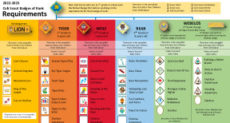 Here are a few final thoughts to conclude our series on leadership for the committee chairman.
Here are a few final thoughts to conclude our series on leadership for the committee chairman.
Don’t help
Yes, that’s right. Don’t help!
Just as we don’t “help” the boys at troop meetings and campouts, we develop leadership in adults the same way – by staying out of their way. You selected and approved your committee members for a reason – because they are talented and able to help with committee functions. Let them work things out their way! Who knows? Their way may well produce better results than if they followed your direction.
Develop a resistance to jumping in and fixing things that don’t need fixing, or that are best fixed by others. Give them a free hand when it comes to their area of responsibility. If you see that they are stuck on something, don’t jump in, take over, or provide the answer, but guide them in the right direction and offer what help they are willing to accept. Only if they ask specifically for direction on how to proceed – indicating that they’re not really stuck, just in a quandary about which way to go – should you consult with them, finding out how they perceive the task and trying to get a feel for how they prefer to move.
Avoid top-down thinking
In top-down organizations, information flows up and orders flow down. They aren’t designing creative solutions and exceeding expectations. Scouting can be a top down organization because the national council sets expectations, gives us the program, and tells us how to do it. They expect followers to be wary of failure and embrace the status quo. You don’t have to be that way on your committee.
The problems with a top-down organization are that its leaders never get the real picture because people tell them what they want to hear. They don’t get the benefit of the wisdom and initiative of the group. Followers in top-down organizations are slaves to the hierarchy of the system; they don’t have the freedom they need to find their own way toward the understood goals.
Your committee can avoid the top-down pitfalls by being more collaborative. Give others ownership of the processes they are responsible for. Let them own the solutions as well.
Signs you’re stuck
Everyone experiences lack of progress periodically. Here are some ways to tell you could be spinning your wheels:
- Day to day urgencies create a fog that obscures your future vision. You are too wrapped up in what needs to be done now that you don’t have an opportunity to consider the larger picture. Delegate what you can, and step back and look at the total environment.
- You keep waiting for perfection, so progress is slow. Don’t let perfect be the enemy of good – know when good enough is sufficient.
- A lack of prioritization leads to confusion. Classify everything into four quadrants along the axes of Urgent and Important. Decide what’s important and urgent, and do those first,
- Lack of delegation leads to a big burden and less opportunity to others. Adopt the mantra: Don’t do it yourself!! The belief that you have to touch everything is a real drag on your time and attention. Give others ownership of large portions of the whole.
- You are too complacent. If you are happy with things the way they are, and don’t see the need to find improvement, the group will never move forward.
- Being afraid of what others think causes timidity. A leader is supposed to be brave and have the confidence to advocate ideas. Sure, others may have objections and ideas, so embrace what others think and incorporate it into the solution.
- Success – oddly, success makes some people feel like they’ve done enough or know enough. Don’t be satisfied with success; look for more ways to improve. You don’t know what you don’t know!
How to get unstuck
Besides getting stuck as a group leader, it’s easy to get stuck in a rut personally. Here are some ways to keep from getting stuck and lift your spirits:
- Send a thank-you note to someone – Think of how someone is doing a great job and send them a note saying so. E-mail is good but postal mail is even better
- Take out a notepad, make two columns and list your joys and frustrations. By putting your contrasting notes to paper, you can see a clearer picture of what you’ve done and what needs doing.
- Make a not-to-do list, and list the things you won’t do today. For instance: complain that something isn’t getting done.
- Identify one thing that would make this day better, and do it.
- Call an old friend or colleague you haven’t talked with in a long time. A Scouter friend could help you gain some perspective.
Why should others follow you?
What’s the simplest, most basic definition of a leader? Someone who has followers, of course. It doesn’t have to be followers in the sense of a “pied piper” being mindlessly followed, but thought followers – people whose thoughts and commitments are aligned with yours. They may have other ways to get where you’re going but they are all on the same page.
Why should others follow you? Ask yourself:
- What value do I bring to those who follow me?
- What qualities of mine inspire others?
- What do I do that creates loyalty in my followers?
- Where am I going that makes others want to follow?
Others have thought about these things. Have you?
You’re more effective when you fully align yourself with your strengths and when you understand what motivates your followers.
I hope you’ve been able to take away some helpful information from this series of articles on committee leadership. Feel free to leave a comment on any of these articles if you have anything to add.
Image courtesy of Renjeth Krishnan / FreeDigitalPhotos.net
This post first appeared on Bobwhite Blather.




“Don’t help”
Delegating is the right path, but oversight is important. We had a $3,000 popcorn debacle because no one was watching. It took years to pay off the debt to the person who covered the cost and return the Troop’s finances to stability. Make sure that accountability is built into critical transactions. If the leftover popcorn needs to be back to council by a certain date, the treasurer AND the committee chair should know that and should have some visibility in the work of the Popcorn Kernel (Colonel).
Most things that a CC can delegate can fail without awful results, but for the ones that will create disaster keep track. Have monthly reports required at committee meetings. Maintain close contact with those volunteers. YMMV.
Larry, you’re right about keeping an eye on critical processes. Finance is one of those where you need to have corporate-style internal controls, such as not having the bank statement sent to the treasurer but preferably to the committee chair, and not having too many people able to sign checks (I’d limit it to the CC, SM, Treasurer and Chartered Org Rep, with 2 signatures required as best practice). Advancement is another area that, while not disastrous, failure can result in a Scout not meeting deadlines or not having his advancement recorded in a timely manner. It can be messy to straighten it out later, so it’s important to do it right in the first place.